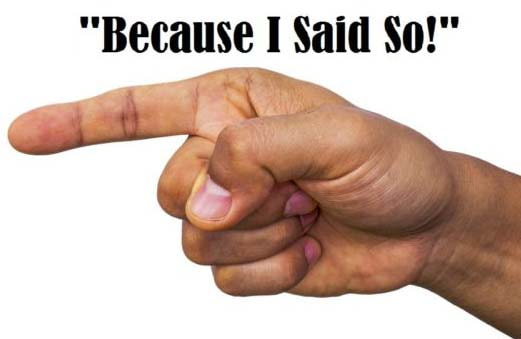|
As a child, I hated being told, "Because I said so!" "It doesn't matter why!" "Just stop crying!" "When you're a parent, you get to be the boss." "Please, just be quiet!" As a parent, I'd like to think that I do better than my parents did, who were young, damaged and struggling to survive as young adults, but I do find myself uttering those phrases I hated and swore I'd never say. There are so many things I start to do automatically, without thinking, because that’s what I learned to do. My parents yelled a lot, at my brother and me and at each other. They also hit us. Being born in the 1950s, things were much different then, and it was more common than today. They both were yelled at and hit as children and on backwards throughout the generations. As a young mother, I sometimes had the urge to hit my children and chose not to do it. I yelled, more than I would like to admit, and still occasionally have to fight both of those urges. What this struggle has done is teach me to understand my own parents more and learn from a few of their mistakes.
How many of us can look back on our childhoods without resentments and praise our parents’ styles of parenting? Some of us can. I know that I can’t. My parents did their best, and yet, they made some monumental mistakes with all three of us. Do I resent them for that? I don't now, but I did for a while. I’ve realized, as I’ve made my own mistakes (some of them monumental), that well-meaning parents will always make mistakes. We're taught that we learn through our mistakes, so it follows that we need to make mistakes in order to learn. Hopefully, as each generation passes, parents will continue to do a little better than their predecessors. Meanwhile, what can we do to stifle those urges? I think the first thing to do is acknowlege them. When we deny them and turn away from the hard realities, they tend to take over little by little. I think it's also important to have compassion for ourselves and for other parents. It's so easy to criticize other people's parenting styles. The truth is, we often have no idea what they've learned from their own parents, what they've gone through in their lives, where they struggle and what is happening in their lives right now. Wouldn't it be nice if we could learn to support each other fully? I've often encountered parents in public who are obviously at their wits end and starting to be what I might see as abusive to their child. In the past, I would sometimes sigh or say something under my breath, or to another adult, condemning the behavior. I noticed that it made the parent even more stressed and, even if it stopped the behavior at the time, I suspected the child would get it even worse after they left. I learned to engage the parent in a friendly way, admiring their child, finding any positive thing to comment on. It doesn't always work but, when it does, it's amazing how quickly the parent switches gears and is able to see their child in a new light. Unfortunately, I've had to visit people in the county jail from time to time. It can be a nightmare of long lines, surly guards and a huge lack of information for newcomers causing much stress. I've used that same technique while standing in a seemingly endless line of families waiting to see their loved ones. Instead of a line of crying kids and frustrated, angry parents, the mood would change, and we would be friendly allies - all of us in the same boat, feeling degraded by the guards, confused and stressed out from the long wait. I wish there was an owners manual for childrearing, but there's not. There are plenty of books that give suggestions, and they are written from many different perspectives. However, every child is unique, as is each parent. One suggestion may work for one child for not another. We each have our own styles and comfort levels. What works for me, might feel very uncomfortable for you. Parenting is all trial and error, and hopefully, we don't do too much harm. My suggestion is that you reach out to other parents for help and offer it in return. Every parent needs people to turn to for an understanding ear and for a brainstorming partner. Don't limit yourselves to your co-parent. Sometimes others can see things more clearly from an outside perspective. To read more about self-comapssion for parents: https://greatergood.berkeley.edu/article/item/self_compassion_for_parents Remember, that you can use this for other parents as well. Imagine yourself in their place. How would you feel in that situation? Sometimes one kind word speaks volumes.
0 Comments
Your comment will be posted after it is approved.
Leave a Reply. |
Archives
April 2019
Categories |


 RSS Feed
RSS Feed